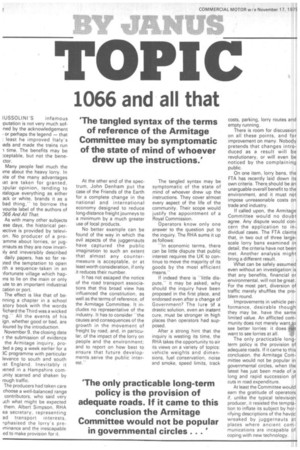'The tangled syntax of the terms of reference of the
Page 44

If you've noticed an error in this article please click here to report it so we can fix it.
Armitage Committee may be symptomatic of the state of mind of whoever drew up the instructions.'
IUSSOLINI'S infamous !putation is not very much sof • ned by the acknowledgement or perhaps the legend — that : least he improved Italy's lads and made the trains run time. The benefits may be xeptable, but not the benector.
Many people feel much the wile about the heavy lorry. In )ite of the many advantages 'at are taken for granted, )pular opinion, tending to rtalogue everything as either ack or white, brands it as a bad thing,' to borrow the vourite label of the authors of 966 And All That.
As with many other subjects ese days, the historical perJective is provided by televion. No producer of a pro • amme about lorries, or jug)rnauts as they are now invarifly and irreversibly described daily papers, has so far re3ted the temptation to open ith a sequence taken in an yfortunate village which hapms to lie on the main or only ute to an important industrial cation or port.
The effect is like that of benning a chapter in a school story book with the words Richard the Third was a wicked ng." All the events of his ign, whether good or bad, are loured by the introduction. November 9, the closing date r the submission of evidence the Armitage inquiry, proled a peg a week earlier for a 3C programme with particular levance to south and south [st England. Inevitably it Jened in a Hampshire cornJnity scarred and shaken by rough traffic.
The producers had taken care choose a well-balanced range contributors, who said very Jch what might be expected them. Albert Simpson, RHA ea secretary, representing ad transport interests, iphasised the lorry's preTninance and the inescapable ed to make provision for it. At the other end of the spectrum, John Denham put the case of the Friends of the Earth for a complete change in the national and international economy designed to reduce long-distance freight journeys to a minimum by a much greater use of local products.
No better example can be found of the way in which the evil aspects of the juggernauts have captured the public imagination to such an extent that almost any countermeasure is acceptable, or at least worth consideration, if only it reduces their number.
It has not escaped the notice of the road transport associations that this broad view has influenced the constitution, as well as the terms of reference, of the Armitage Committee. It includes no representative of the industry. It has to consider "the causes and consequences of the growth in the movement of freight by road, and, in particular, of the impact of the lorry on people and the environment; and to report on how best to ensure that future developments •serve the public interest.'" The tangled syntax may be symptomatic of the state of mind of whoever drew up the instructions. They cover almost every aspect of the life of the community. Their scope would justify the appointment of a Royal Commission.
Operators know only one answer to the question put to the inquiry. The RHA sums it up as follows: "In economic terms, there can be little dispute that public interest requires the UK to continue to move the majority of its goods by the most efficient means."
If indeed there is "little dispute," it may be asked, why should the inquiry have been proposed in the first place, and endorsed even after a change of Government? The lure of a drastic solution, even an instant cure, must be stronger in high places than operators had supposed.
After a strong hint that the inquiry is wasting its time, the RHA takes the opportunity to air its views on a variety of topics: vehicle weights and dimensions, fuel conservation, noise and smoke, speed limits, track costs, parking, lorry routes and empty running.
There is room for discussion on all these points, and for improvement on many. Nobody pretends that changes introduced as a result will be revolutionary, or will even be noticed by the complaining public. On o one item, lorry bans, the ETA has recently laid down its own criteria. There should be an unarguable overall benefit to the environment, and it must not impose unreasonable costs on trade and industry.
If called upon, the Armitage Committee would no doubt agree. Any dispute would concern the application to in-. dividual cases. The FTA claims that, in two out of three largescale lorry bans examined in detail, the criteria have not been met. Another analysis might bring a different result.
What can be safely assumed even without an investigation is that any benefits, financial or environmental, will not be great. For the most part, diversion of traffic merely shuffles the problem round.
Improvements in vehicle performance, desirable though they may be, have the same limited value. An afflicted community does not merely want AU see better lorries: it does r44t want to see lorries at all.
The only practicable longterm policy is the provision of adequate roads. If it came to this conclusion, the Armitage Committee would not be popular in governmental circles, when the latest has just been made of a long and rapid succession of cuts in road expenditure.
At least the Committee would earn the gratitude of operators if, unlike the typical television producer, it resisted the temptation to inflate its subject by horrifying descriptions of the havoc wreaked by juggernauts at places where ancient communications are incapable of coping with new technology.




























































































































































